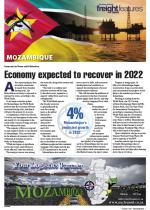The World Bank has approved a $150-million (R2.2-billion) grant from the International Development Association (IDA) to support the first phase of Mozambique’s Sustainable Rural Economy Programme. In its first phase, the 10-year programme will tackle some of the pressing challenges facing small agriculture producers and fishers as well as micro, small and medium enterprises (MSMEs), while improving natural resources management practices, according to a bank statement.The agricultural sector – the biggest employer in Mozambique – continues to struggle to recover,according to the Famine EarlyWarning System Network (FEWSNe t).In mid-year, the Ministry of Agriculture and Rural Development predicted that there would be an overall increase in agricultural production of around 8% over 2020. This is largely in line with the Water Requirement Satisfaction Index (WRSI), which estimates near-average to above-average production for maize grain. However, in eastern Nampula and eastern Cabo Delgado, agricultural production is expected to be well below average due to below-average rainfall and, particularly in Cabo Delgado, the impact of conf lict. Below-average production is also expected in northern Maputo province and the lower Limpopo valley in Gaza due to dry spells at the beginning of the season and f looding in February, according to FEWS Net.Much of the organisation’s map of Mozambique lists it as “stressed”, with the northern Cabo Delgado area in a state of “crisis”.The prognosis for 2022 is more positive: average to above-average rainfall is expected across much of Mozambique between October 2021 and March 2022, driven by weak La Niña conditions from August 2021 through March 2022. An average to above-average 2021/22 agricultural season is likely to support household food stocks and income from agricultural labour and crop sales across Mozambique for a second consecutive year, except in eastern Cabo Delgado due to the current insecurity. However, there is a moderate to high risk for localised f looding in a number of areas which may affect yields, according to the FEWS Net analysis.Commenting on the grant, Idah Z Pswarayi-Riddihough, World Bank country director for Mozambique, Madagascar, Comoros, Mauritius, and Seychelles, said “the rural space is the backbone of livelihoods for most of the population in Mozambique. It also accounts for most of the country’s poor.“Rapid rural population growth adds an estimated 450 000 youth to the country’s workforce every year, making the focus on rural income growth imperative to promote inclusive growth and prevent conf licts.”The project will provide support to small agriculture producers and fisheries to increase their productivity and access to markets and help MSMEs improve their sales while promoting the adoption of climate-smart agriculture practices. Additionally, the project will invest in extension services and basic “rural climate-proof transport infrastructures”.“It’s evident that economic expansion in agriculture yields the highest impact on poverty reduction in Mozambique,” added Diego Arias Carballo, lead agriculture economist, and the operation’s task team leader. “However, the sector’s potential continues to be challenged by low productivity, mostly due to low technology adoption, and limited provision of agricultural services, coupled with high seasonality in production, as well as increasing climate vulnerability. This project seeks to address some of these challenges. There is a moderate to high risk for localised flooding in a number of areas, which may affect yields.– Famine Early WarningSystem Network

